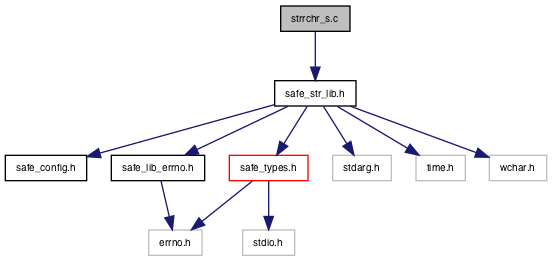strrchr_s.c File Reference
#include "safe_str_lib.h" Include dependency graph for strrchr_s.c:
Include dependency graph for strrchr_s.c:Functions | |
| EXPORT errno_t | strrchr_s (const char *restrict dest, rsize_t dmax, const int ch, char **result) |
| Finds the last occurrence of ch (after conversion to char as if by (char)ch) in the null-terminated byte string pointed to by dest (each character interpreted as unsigned char). More... | |
Function Documentation
◆ strrchr_s()
| EXPORT errno_t strrchr_s | ( | const char *restrict | dest, |
| rsize_t | dmax, | ||
| const int | ch, | ||
| char ** | result | ||
| ) |
Finds the last occurrence of ch (after conversion to char as if by (char)ch) in the null-terminated byte string pointed to by dest (each character interpreted as unsigned char).
The terminating null character is considered to be a part of the string and can be found when searching for '\0'. Unlike strrchr() it honors dmax as maximal string length.
- Remarks
- IMPLEMENTED IN
- Parameters
-
[in] dest pointer to string to compare against [in] dmax restricted maximum length of dest [in] ch character to search for [out] result pointer to char* in dest
- Precondition
- Neither dest nor result shall be a null pointer.
- dmax shall not be 0.
- dmax shall not be greater than RSIZE_MAX_STR.
- ch shall not be greater than 255
- Return values
-
EOK when successfully character found. ESNULLP when dest/result is a NULL pointer ESZEROL when dmax = 0 or strnlen_s = 0 ESLEMAX when dmax > RSIZE_MAX_STR ESLEMAX when ch > 255 ESNOTFND when ch not found in dest
- See also
- memrchr_s(), strchr_s(), memchr_s(), strspn_s(), strstr_s()
